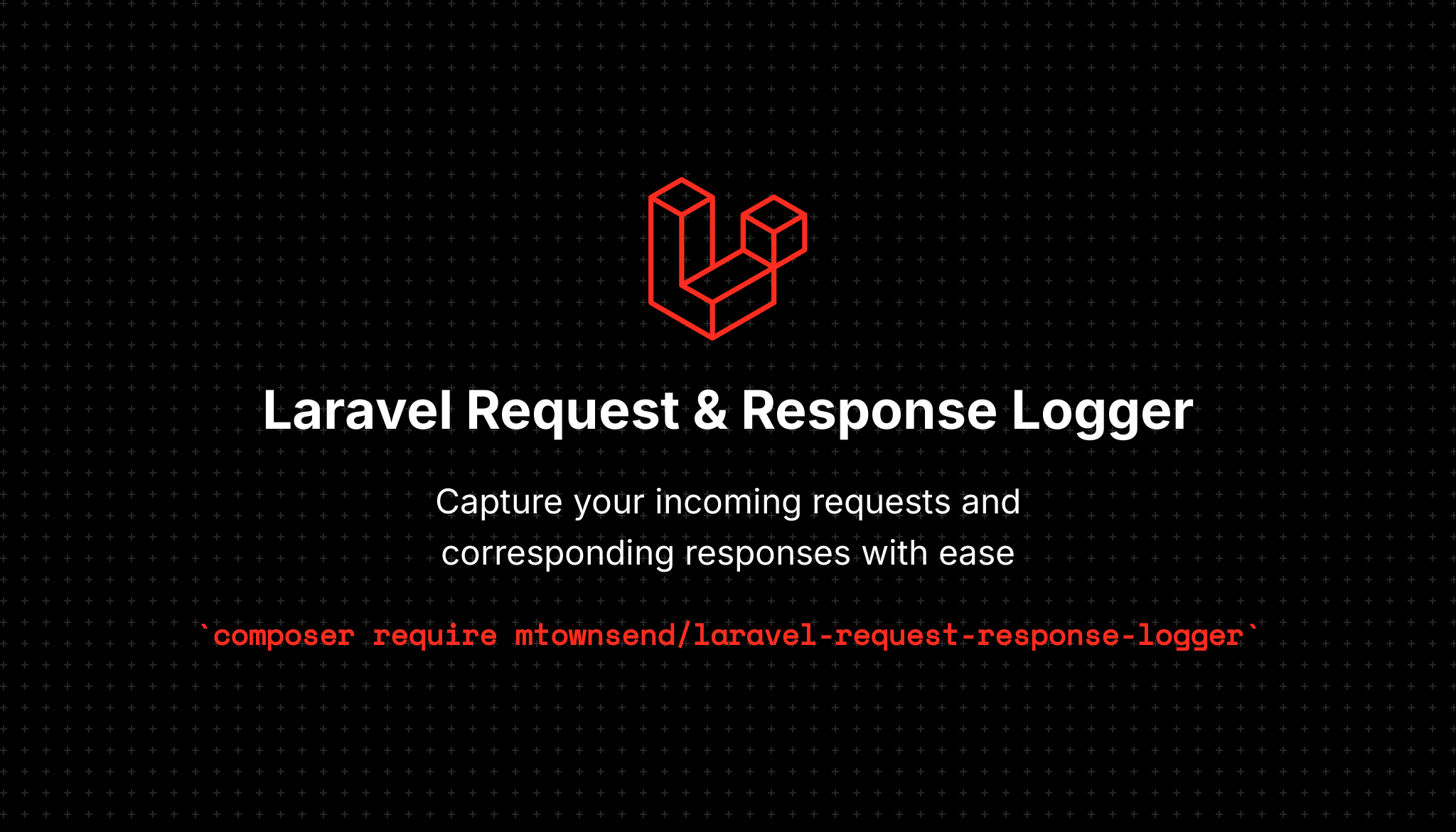Easily capture every incoming request and the corresponding outgoing response in your Laravel app.
This package is designed to work only with the Laravel framework.
Installation
Install via composer:
composer require mtownsend/laravel-request-response-logger
Registering the service provider (Laravel users)
For Laravel 5.4 and lower, add the following line to your config/app.php:
/*
* Package Service Providers...
*/
Mtownsend\RequestResponseLogger\Providers\RequestResponseLoggerServiceProvider::class,
For Laravel 5.5 and greater, the package will auto register the provider for you.
Publish the migration and config files
You will need to publish the migration and configuration file before you can begin using the package. To do so run the following in your console:
php artisan vendor:publish --provider="Mtownsend\RequestResponseLogger\Providers\RequestResponseLoggerServiceProvider"
Next, you need to run the migration for the new database table. Run the following in your console:
php artisan migrate
Setting up the middleware (important!)
In order to begin logging requests and responses you will have to attach the middleware to the routes you want to log. The package does not make this assumption for you, since not everyone may want to log every route.
Now, navigate to your /app/Http/Kernel.php
You can choose which method you would like to use. We've provided a few different options below:
OPTION 1: Bind the middleware to a name you can call only on the routes you want
protected $routeMiddleware = [
...
'log.requests.responses' => \Mtownsend\RequestResponseLogger\Middleware\LogRequestsAndResponses::class,
];
Then apply the named middleware to whatever routes you want:
Route::post('/some/route', SomeController::class)->middleware(['log.requests.responses']);
OPTION 2: Assign the middleware to a route group
protected $middlewareGroups = [
...
'api' => [
...
\Mtownsend\RequestResponseLogger\Middleware\LogRequestsAndResponses::class,
],
];
OPTION 3: Assign the middleware to every route
protected $middleware = [
...
\Mtownsend\RequestResponseLogger\Middleware\LogRequestsAndResponses::class,
];
That's it! The middleware will log every incoming request it receives!
Customizing your configuration (optional)
This package provides a few customizations you can make.
When you navigation to app/config you will see a log-requests-and-responses.php file. It will contain the following:
return [
/**
* The model used to manage the database table for storing request and response logs.
*/
'logging_model' => \Mtownsend\RequestResponseLogger\Models\RequestResponseLog::class,
/**
* When logging requests and responses, should the logging action be
* passed off to the queue (true) or run synchronously (false)?
*/
'logging_should_queue' => false,
/**
* If stored json should be transformed into an array when retrieved from the database.
* Set to `false` to receive as a regular php object.
*/
'get_json_values_as_array' => true,
];
Housekeeping
You may want to utilize some housekeeping to prevent your logs table from getting too large. This package supplies a preregistered command for wiping the table clean. You may run it manually
php artisan request-response-logger:clean
You may also schedule it to be run automatically in app/Console/Kernel.php:
protected function schedule(Schedule $schedule)
{
...
$schedule->command('request-response-logger:clean')->quarterly();
}
Advanced Usage
Model scopes
If you would like to work with the data you've logged, you may want to retrieve data based on the http code your app returned for that request.
use Mtownsend\RequestResponseLogger\Models\RequestResponseLog;
// Get every logged item with an http response code of 2XX:
RequestResponseLog::successful()->get();
// Get every logged item with an http response code that ISN'T 2XX:
RequestResponseLog::failed()->get();
Replacing the RequestResponseLog model with your own
You may want to extend the base RequestResponseLog model with your own. This is entirely possible.
First, create your own model
php artisan make:model RequestResponseLog
Then in your model, extend the base model:
namespace App\Models;
use Illuminate\Database\Eloquent\Factories\HasFactory;
use Mtownsend\RequestResponseLogger\Models\RequestResponseLog as BaseRequestResponseLog;
class RequestResponseLog extends BaseRequestResponseLog
{
use HasFactory;
}
Then in your app/config/log-requests-and-responses.php:
'logging_model' => \App\Models\RequestResponseLog::class,
Now the package will utilize your model instead of the default one.
Testing
You can run the tests with:
vendor/bin/phpunit
License
The MIT License (MIT). Please see License File for more information.

